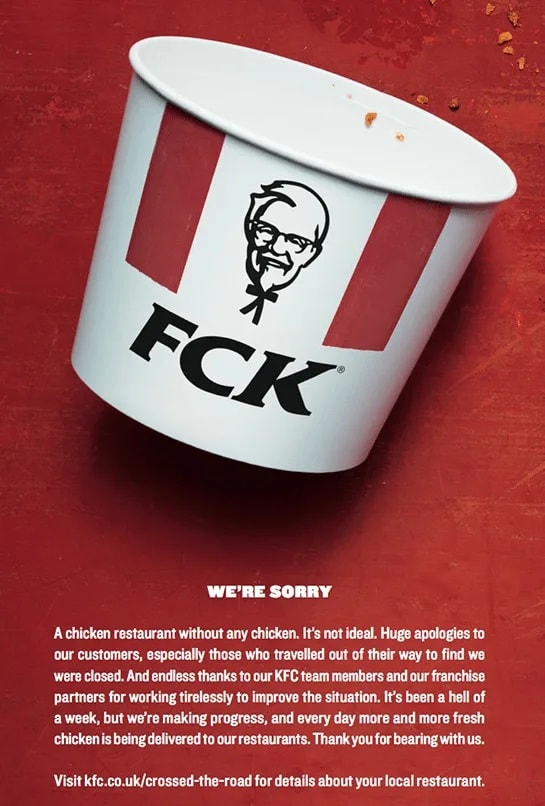Do you like fried chicken? A year ago or so, KFC -the chicken fast-food chain- was featured in almost every news outlet in the UK: they ran out of chicken for an entire weekend. A horror story for a food-chain with 900 restaurants in the country. People were mad at them, and they were the target of enormous criticism. What did KFC do to address this uncomfortable position?
KFC UK worked together with their advertisement agency to plan how to handle the public relations turmoil. An apology arose, but not a dry one. A straightforward tweak using their brand along with a written apology was a splendid move. Check it out:
KFC (published in two national printed newspapers). Take a look at this video from Cannes Lions:Yeah, the agency and KFC won an award for this.
The pratfall effect
In the 1960s, psychologist Elliot Aronson coined the term ‘pratfall effect’ describing some of his research findings.
“The pratfall effect is a phenomenon where people who are perceived as competent, are perceived as more likable or attractive when they commit a blunder.”
Aronson ran an experiment recording an actor while pretending to be answering quizzes. The quizzes results were also recorded. In one condition, after ‘solving’ the questionnaires (92% right, on purpose) the actor pretended to spill a cup of coffee over himself. In the other condition, there was nothing clumsy. The recordings were played to a large sample of students who rated afterwards how likable was the participant shown. The clumsy one was rated better.
VW), Avis, Stella Artois, and some other brands have used the effect on advertising campaigns. Let’s talk about a VW case. The VW Beetle was a success thanks to the sharp copywriting pointing to some (apparently) discouraging aspects of the car model. “Ugly”, “slow”, “noisy”, “expensive” is what you would have seen in one of the ads in those glorious years for the Beetle. Thanks to adman and writer Richard Shotton, I came across this funny VW ad: “Think Small” (see below), featuring the supposedly not-that-right size of the vehicle. Counterintuitive. That’s the complexity of the human mind.
Wrote Shotton in Mumbrella.
Epic failures and honesty
Have you ever had an epic cybersecurity failure? I bet you have. Fluid Attacks has also been there (yeah, I know because I was responsible for one). The FCK story and, more broadly, the pratfall effect tells us something valuable about handling incidents and signaling who we are.
Back in 2014, one of our customers angrily called us because of a security incident provoked presumably by one of our pentesters; he performed a denial of service attack on one workstation, and it appeared to have collapsed a middle network security device, leaving large corporate systems offline for around 45 minutes. You read that right: a pentesting company, hired to make IT more secure, causing mission-critical systems to be out of service (a contradiction, just like in the KFC situation). We met immediately with the manager who hired us; we asked him to tell us about the incident; the losses seemed financially significant. It was an awkward, tense 30-minute meeting. I remember we asked some technical questions about how the incident unfolded. Our colleague admitted his mistake, and we had nothing more to do than offer a sincere apology and to come back with a proposal to compensate for the outage. The project was halted.
A few days later, my boss at the time met with the customer and agreed to resume the project and accepted our compensation proposal. We then reflected on this incident. The words of our CEO at the time still resonate in my mind: “responsibility before profits.” Today, that customer continues to trust Fluid Attacks; and both of us have been able to put that incident in the past.
We shouldn’t be afraid about being honest when a possibly (huge) error was made. A company admitting errors makes itself more human. Customers, we know, value companies that are perceived close to them. Everybody knows that as humans, we make mistakes, so do companies or brands. The act of signaling some blunders makes brands to be perceived as more trustworthy. Admitting weakness is concrete proof of honesty and, consequently, makes other claims more believable.
If you ever are responsible for a security breach, tell your company. Accept your responsibility, bet on the pratfall effect; choose honesty. Also, do it quickly. Many companies have feared a lousy reaction from business errors or adverse circumstances following this path but have succeeded. Have you heard about Johnson & Johnson and their Tylenol product poisoning?
Failures and not-so-good outcomes from handling strategy
I’ve been a learner at Datacamp for almost three years. This company provides online training in data science in a bunch of technologies (Python, R, SQL, and others). A couple of days ago, I got to know over Twitter about a scandal concerning that company. The CEO was involved in sexual harassment to an instructor in 2017; this can be found on many websites as well in Twitter. The data science community, in support of the victim (a research scientist), started a “boycott” this April (example). In short, dozens of instructors started to tell people not to take their courses on Datacamp and to use other available resources. The reason? Datacamp management tried to hide or diminish the incident as people demanded transparency and accountability for the issue, a long time ago. Companies, like RStudio, also spoke up against the bad Datacamp handling. On April 24th, a very late communication from the company’s board announced that the CEO was stepping from his position indefinitely. I bet if the strategy was different, all this could have been avoided. Datacamp is a big worldwide player in the e-learning market, and it failed to embrace the pratfall effect. I would say that their “rational” approach led to the disastrous public relations handling, eroding their trust.
At Fluid Attacks, we’re not flawless, but we do our best
We are humans, and we make mistakes. It doesn’t help to hide or diminish errors. As we saw in this post, this might harm in unexpected ways. Conversely, being open and confront our flaws could have massive returns. By doing this, we are perceived more human, more real, and thus, the trust on us strengthens. We wanted to share with you another perspective of human nature related to our day to day mission in cybersecurity. No individual and no organization is fully protected against security breaches. We must understand that fact, and we should prepare the best we can to avoid those breaches. We, at Fluid Attacks, try the best we can to infuse that premise among our employees. We also share with our customers that we are not flawless, and that sh*t happens from time to time.
We invite you to check our services if you still don’t know about them. We offer Continuous Hacking, a service that provides a constant review of your source code and applications, looking for vulnerabilities (allowing the develop team to focus only on the development), as well as the tracking of the found weaknesses. The service leverages on our Attack Surface Manager (ASM). ASM is a critical component of our value proposition. We know ASM is not yet a front runner. We don’t know whether we are the number one, or the second, but we work hard to make it better for you.




